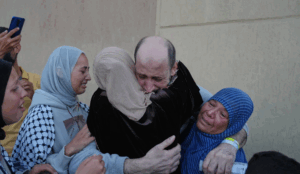Nearly 2,000 Palestinian detainees released in Gaza ceasefire including 250 serving life sentences

A Palestinian prisoner reunites with his family in Khan Yunis in the Gaza Strip on 13 October 2025
Josh Breiner and Jack Khoury report in Haaretz on 13 October 2025:
As part of the cease-fire and hostage release agreement between Israel and Hamas, 1,968 Palestinian detainees and prisoners were released on Monday – 1,718 detainees and 250 inmates serving life sentences after having been convicted of murder or attempted murder of Israelis.
The detainees are Gaza residents who were classified as “illegal combatants” and arrested by IDF forces during the course of the war. They were transported with the assistance of the Red Cross from the Kerem Shalom crossing into the Gaza Strip, where they were released. Their release took place after Israel received confirmation that the 20 remaining living Israeli hostages had been returned to Israel.
Of the 250 released life prisoners, 154 were deported to Egypt via the Kerem Shalom crossing, while 74 were released at the Beitunia crossing near Ramallah in the West Bank after being transported there from the nearby Ofer Prison. Another 18 prisoners, who had lived in Gaza prior to their incarceration, were transferred to the Strip, and the remaining four were released in East Jerusalem.
According to the roster published by the government on Friday, 159 of the prisoners are affiliated with Fatah, and 63 with Hamas. The rest are either unaffiliated or belong to Islamic Jihad, the Popular Front for the Liberation of Palestine (PFLP), or ISIS.
Fifteen of the prisoners hold Israeli residence permits, while the rest are residents of the territories. Of the prisoners, 221 are from the West Bank, and 16 lived in the Gaza Strip before their arrest. Twelve prisoners lived in East Jerusalem, and one resided abroad.
During the release, clashes broke out after officers from the Israel Prison Service boarded one of the buses carrying Gazan detainees who had flashed victory signs from the windows.
In the streets of Ramallah and Khan Yunis, the buses were greeted with singing, Palestinian and other party flags, and tears. Young people climbed onto the roofs of vehicles to embrace their loved ones, and elderly women carried trays of dates and perfumed water to welcome those returning from decades behind bars. Some mothers and sisters waiting for their relatives learned that their family members would be deported to the Strip or to a third country. Despite the emotional overwhelm, the celebrations were subdued, partly due to Israeli threats against the prisoners’ families.
Some of the released prisoners remained cautious with their statements to the media, and were instructed not to make political statements, but all noted that their release was a dream come true, even if they had lost a third of their body weight during their long years of imprisonment.
Meanwhile, Israel’s refusal to release prominent Palestinian leaders such as Marwan Barghouti continued to make waves. His wife, Fadwa al-Barghouti, published a personal letter addressing his continued imprisonment: “For Gaza, for Palestine, for our people … Yes, Marwan, it is hard and painful, but I know what comforts you – the cessation of destruction and crimes against our people in Gaza. Despite all the suffering, the heart of the mother within me feels great relief and dreams of a new dawn for mothers. We are waiting for you – I, the family, and your people who love you and whom you love,” she wrote.
Her words were received in the Palestinian street as a renewed call for national unity and for her husband’s release, with Barghouti being mentioned as a possible future leader of the Palestinian people.
Early Monday morning, the government approved the addition of five more names to the list of Gazan detainees expected to be released in the cease-fire deal. One of them is Dr. Hussam Abu Safiya, director of Kamal Adwan Hospital in northern Gaza, who was arrested by the Israeli army in December 2024, an arrest that drew harsh international criticism of Israel.
The five were added to the list, which numbers about 1,700 Gazan detainees, as “potential substitutes” in case any of the Gazans slated for release under the deal are not freed, according to the decision.
This article is reproduced in its entirety
